#transgender today (series)
Text
Being a sapphic trans girl is looking at art of fictional women and not knowing if the feeling you get is attraction or envy.
#its both#trans#trans meme#transgender#transgirl#today this is a subpost ablut rottytops from the shantae series#but tomorrow it will be a subpost about someone else
14 notes
·
View notes
Text

a liiittle late but happy Trans Visibility Day from my trans-spec OCs!
more of a simple doodle because i was running outta time haha
#i wanted to do something for easter too but today was SO busy#easter#trans visibility#trans pride#jj rambles#my art <3#fatesplitter series#oc doodles#genderqueer#transgender#nonbinary
5 notes
·
View notes
Video
youtube
@shinjiroatae1126: To all my fans, today was a very special day for me. For years, I struggled to accept a part of myself...But now, after all I have been through, I finally have the courage to open up to you about something. I am a gay man.
It has taken me a long time to be able to say I am gay. I could not even say it to myself. However, I’ve come to realize it is better, both for me, and for the people I care about, including my fans, to live life authentically than to live a life never accepting who I truly am. I hope people who are struggling with the same feeling will find courage and know they are not alone.
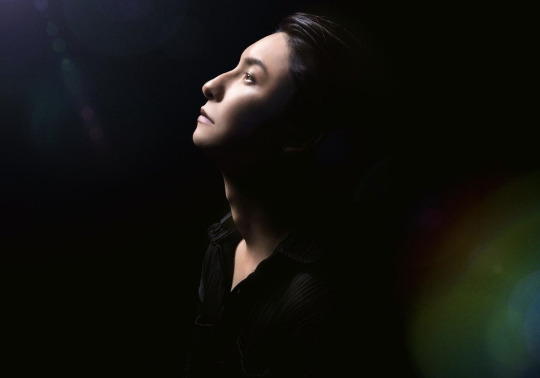
ps, he’s released a new song, “into the light”, which you can watch here. part of the proceeds from the single will go to lgbtq+ organisations
@shinjiroatae1126: July 26th, 2023 was a big day for me. I finally gathered the courage to come out to the public as a gay man. I am grateful to have received media coverage from multiple platforms both within Japan and overseas.
To be honest, I was extremely anxious before all of this happened. However, I've been pleasantly surprised to discover the overwhelming amount of positive feedback pouring in from both my fans and people who have come across the news about me. It's heartwarming to see that my story is being acknowledged from all around the world, and this brings me immense joy.
Although they may be baby steps, I sense that this world is gradually moving into the light. Yesterday, I made an announcement about resuming my career as an artist. I also released a new song titled “Into The Light”. The music video for the song is also on YouTube now. This song is packed with the emotions and thoughts leading up to this point, including my decision to come out.
Living with anxieties and struggles is not limited to just LGBTQ+ individuals. I hope this song can be a source of encouragement for anyone carrying such emotions. I've aimed for it to become a song that can uplift those with similar feelings.
A portion of the proceeds will be donated to Pride House Tokyo, Japan’s first permanent LGBTQ+ center, and ReBit, an organization providing resources and support for LGBTQ+ youth. I hope this song will touch many hearts.🙏🌈

At first, there was total silence. Then, there were shrieks, wild applause, weeping and shouts of “I love you!”
Fans of Shinjiro Atae, a J-pop idol who has been on a nearly two-year performance hiatus, had come to hear him talk about “the challenge of my life.” Standing onstage in a dark auditorium in front of 2,000 fans in central Tokyo on Wednesday night, he revealed something he has kept hidden for most of his life: He is gay.
“I respect you and believe you deserve to hear this directly from me,” he said, reading from a letter he had prepared. “For years, I struggled to accept a part of myself. But now, after all I have been through, I finally have the courage to open up to you about something. I am a gay man.”
Such an announcement is extremely unusual in conservative Japan, the only G7 country that has not legalized same-sex unions. Earlier this summer, the Japanese Parliament passed an L.G.B.T.Q rights bill but it had been watered down by the political right, stating that there “should be no unfair discrimination” against gay and transgender people.
In making a public declaration, the 34-year-old Mr. Atae, who spent two decades performing with AAA, a hit Japanese pop group, before embarking on a solo career, said he wanted his fans to know his true self. He also hopes to comfort those who might be grappling with anxieties about their sexuality.
“I don’t want people to struggle like me,” he said.
AAA debuted in 2005, with Mr. Atae, the youngest member, forgoing high school. He performed mostly as a dancer, and began appearing in TV series and movies.
His sexuality perplexed him. “It was a time when on TV, comedians would say two men kissing was gross,” he said. If anyone asked if he had a girlfriend, he just said he was too busy working.
Activists said they could not recall an instance when a Japanese pop star of his stature had publicly declared they were gay, because of anxieties about losing fans or sponsors.
“I think he has decided to come out in order to change Japan,” said Gon Matsunaka, a director and adviser to Pride House Tokyo, a support center for the gay and transgender community.
The decision to open up about his sexuality, he said, evolved over seven years of living in Los Angeles, where he saw how freely gay couples could show affection in public and built an extensive support network.
“Everyone was so open,” he said. “People would talk about their vulnerabilities. In Japan, people think it’s best not to talk about those things.”
Mr. Atae’s decision, he said, was not political. All he wanted, he said, was to “normalize” being gay. Coming out, he knew, would likely draw criticism. “Whatever you do, there will be haters,” he said. “I can only focus on the people I might be helping.”
#this made my week :')#please give his new song a listen and leave him a lovely comment on instagram#shinjiro atae#aaa#japan#jpop#queer#lgbt#lgbtq#gay#long post
1K notes
·
View notes
Text
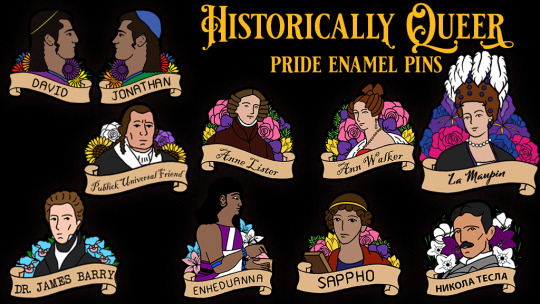
Launching Tuesday - Historically Queer, our next enamel pin collection!
We Have Always Been Here.
Ten pins - two pairs, five single pins, and the La Maupin mega pin (she needed extra room for her headdress) - each with multiple unlockable colorways.
We launch Tuesday, 9/12, at 3PM Eastern, noon Pacific. Follow us on Kickstarter to be notified when we launch -- or just to help out! The visibility to Kickstarter from having followers on our campaign helps a lot. :D
Featured in this campaign:
Enheduanna, oldest named author. Incorporating trans themes into writing thousands of years old.
David & Jonathan, king & prince whose love surpassed the love of women.
Sappho, Lesbian poet. She should need no other introduction.
La Maupin, also known as Julie d'Aubigny. The original disaster bisexual. Opera singer, swordswoman. May have burned down a convent.
Publick Universal Friend, American religious figure. Going by gender-neutral pronouns since the year the Declaration of Independence was written.
Anne Lister & Ann Walker, the Gentleman Jack & her wife. Acknowledged as the first same-gender marriage in modern Britain.
Dr. James Barry, British surgeon. A transgender man, Dr. Barry performed the first C-section done by a European in Africa in which both mother & child survived. He is also credited with vastly improving conditions for wounded soldiers in the British military.
Nikola Tesla, Serbian-American genius. Listing Tesla's inventions would take a series of posts. Liked pigeons better than people.
If you don't see your favorite historical figure, don't fret! We've planned multiple sets of Historically Queer figures. We can't use them all up at once. :) Help ensure we can make future sets by helping us create this one!
Frequently Asked Questions under the cut.
Hey, what flag is that on Sappho?
That's the Sapphic flag, created by @tepkunset. NerdyKeppie's owner, Spider, is a butch lesbian who uses that flag for their art.
Hey - what about [historical figure]? How could you forget [historical figure]? This is erasure!
We didn't forget, we promise - this is the first of several installments of this project. After the absolute stress of the last Kickstarter when we had 300+ different SKUs by the end of the project, we decided to take a more focused approach to Historically Queer. We attempted to provide a good cross-section of identities, and will continue to expand in future projects. Spider has a huge folder on his computer full of planned pins and reference images.
But historically...
Yes, we know that it isn't totally proper to use today's terms to discuss people who lived a long time ago. But also, how else do we talk about our community history in a way that's understood, and celebrate our shared queerness, other than to use the words and iconography which are understandable to us now? We celebrate our shared history with the words and understandings most accessible to all of us, and we hope that by providing not just the pins but a few elementary facts about these historical figures, we'll encourage people to read more about them in their original context.
#nerdykeppie#lgbtq#queer pride#trans pride#enamel pins#update#lgbt#pride#news#kickstarter#kickstarters#crowdfunding
1K notes
·
View notes
Note
Sorry for asking but I am a cis male teenager (well, I thought I was.) but lately I have realized I think I might be a trans girl? I am very scared to drop my masculinity. How did you find out you were trans if that’s okay to ask?
Of course it's ok! I am always happy to help someone who is questioning their gender. However, this is actually a pretty loaded question, because while there is a lot of talk about "when my egg cracked" in trans circles, figuring out you're trans isn't always attributable to any one singular event. Some folks might crack through and emerge from their egg in one swift motion but that is not true for everyone, it certainly wasn't true for me. Sure I could tell about the moment the first crack in my shell appeared, but a single crack in the egg is a far cry from actually breaking out. For many it's a process that can involve a series of revelations and tends to require lots of self reflection and learning how to love yourself. So, there is no quick and easy answer for this. However, I think my story will have a number of different lessons relevant to your question.
Before getting into all that though, I feel I must point out that cisgender folks rarely ask themselves these kinds of questions and when they do entertain these thoughts it's brief and comes with very little agony. The fact you have gone so far as to reach out to trans woman for advice, the fact the you are clearly worried by the prospect of being trans, is a pretty clear indicator that you probably are trans. Regardless of whether you actually are transgender or not, I want you to know that either way, it's ok. You will be ok, no matter what conclusions you come to.
Now, the story of how I figured out I was trans. Bear in mind, the first “aha moment” was 20 yrs ago and things were very different back then. I was about 17yrs old at the time and the term transgender didn't have the currency then that it does now, there wasn't the robust set of terminology that we have today, there were far fewer resources to turn to, no social media, and the overall public opinion was significantly more hostile towards anything LGBT. Anyway, more below the cut.
I didn't follow the typical trans narrative of the time in the sense that, as a child I didn't really care about my clothes so long as my favorite cartoon characters were on 'em, I liked toys typically marketed towards boys, I looked like a boy and everyone referred to me as a boy. So I thought I was a boy. However, I do have a vague memory from early childhood, somewhere between the ages of 4-6, of sneaking into my mother’s room and stealing a pair of her satin underwear and trying it on (it surely would have been too big on me but I remember liking the texture of the fabric) and hiding it under my bed. This memory has since been confirmed during my adulthood by my brother who shared a room with me at the time and had apparently found the hidden stash.
From an early age I was explicitly shunted towards masculinity. I was regularly told to “stop acting like a girl,” and “quit crying like a girl,” and even at one point to “stop walking like a girl,” by my peers and one of my brothers. By the time I was a teenager I was doing my best to be as masculine as possible going so far as joining the highschool wrestling team, a sport that is as homophobic as it is homoerotic, and I hated every minute of it because being manly didn't feel natural to me (and it definitely didn't stop the bullying). It felt like I was trying to ice skate uphill. I fit in but only imperfectly for I was merely acting.
I was also very confused about my sexuality. I thought maybe I was gay or bisexual (turns out the latter) but that didn’t really explain what I was feeling. Around 17yrs old I got curious about transsexuals, thinking maybe the answers would be found there and hoped on to the early and oh so clunky internet. Now I knew of transsexuals conceptually but I didn't know anything about them. Sadly, pornography was really the only reliable way to actually see what a trans body looked like back then. I was stunned because the women I saw did not look at all the way I expected. I was blown away by how so many of them, genitalia aside, looked indistinguishable from cisgender women. And they were all absurdly beautiful. I felt an immediate attraction but there was something else I felt too, envy. And that realization was the first crack in my eggshell.
After that I couldn't get the thought of crossdressing out of my head. So, I dug through a box of my mother's old clothes and took a few items she no longer wore, an old white tennis skirt and a very very 70s sleeveless orange blouse. I was so comfortable in those clothes and when I looked at myself in the mirror I felt good, really good. So, I continued exploring, shaved off all of of my body hair, went to department stores that were open late at night to buy girl clothes (deathly afraid someone would recognize me), I would stay up late at night to watch HBO because at midnight they would occasionally air stuff about trans people, (I remember two documentary shorts in particular and the movie Soldier’s Girl) and I scoured the internet for more information. The internet search brought me to a website called TG list (at least I think that’s what it was called, this was 20yrs ago after all) which was a directory of resources ranging from The Breast Form Store (which still exists!), a myriad of gender identity quizzes (I took nearly every single one), and Susan’s Place.
Susan’s place was one of the few reliable places to hear from actual transgender adults. Unfortunately, while Susan's Place had a lot of useful information the forums there were full of horror stories, a never-ending supply of all the things those women had suffered. So needless to say, there was little to no positivity around transness to give me hope. I was afraid to call myself trans as a result, afraid of what it meant for my life, my future, and my physical safety (you have to remember that back then Mathew Shepard wasn’t old news, his tragedy was practically current events). So I called myself a crossdresser but for reasons I didn't understand at the time I deeply resented that label. I think deep down, no matter how much I tried to deny it and bury it, a part of knew I wanted to be a girl. So when I came out to my parents as a crossdresser and explicitly told them I wasn't trans, that I didn’t have any desire to transition to female, there was that lil voice at the back of my mind calling me a liar. That voice would follow me until my late 20s.
Coming out was a real struggle for me because not only did I think my life would literally be in jeopardy, I thought everyone would think I was making it up, having not followed the stereotypical models of transsexuality. When I came out to my parents they didn't disown me or anything but they were noticeably uncomfortable around me when I was in girl mode. At a certain point I needed their help (credit card) to buy a gaff for tucking and that was when my parents, out of a misguided desire to protect me, pushed me back into the egg. Because of their rejection I spent the rest of highschool and most of my college years trying to hold the egg together with even more denial and by doubling down on masculinity. While I did have some fun during my college years, on balance I was miserable and depressed. I chafed at my male costume and I knew I was lying to myself the entire time, and I hurt myself a great deal.
During my senior year of college I started privately dabbling with crossdressing again, the desire had been nagging at me incessantly. A short time after graduating I met my wife who accepted that side of me and she introduced me to the BDSM/kink community, and the overall culture of nonjudgmental acceptance there cracked the egg for good, because is provided spaces besides my own room where I felt safe being a girl. From that point on I slowly but surely came out of the egg, first calling myself a crossdresser, then genderfluid for awhile, then GENDA passed in NY making me an explicitly protected class and for the next 2 yrs I presented as a they/them genderqueer woman 100% full time without HRT (I was still reluctant to call myself a woman).
I wrestled a long time with the choice to go on HRT. Ultimately that was always a big stumbling block for me. Therapy had gotten me pretty far but I was still afraid of so much and was unsure I would be happy with the changes because my parents had initially rejected me as their daughter in very paternalistic fashion I struggled to trust my own instincts. I still struggle with that sometimes. Eventually, I befriended a trans woman in my neighborhood who pointed out HRT works very slowly and that it takes a long time for any permanent changes to take root. So, she suggested I give it a try and if it didn't feel right I could stop.
I was also taking gender identity quizzes again. Now most of these claim to be diagnostic and those ones a generally misogynistic garbage (they ask stupid questions like, “are you good at math?” and assign a gendered value to the answer) but I happened upon one that started with the disclaimer that it wasn't diagnostic and instead only offered questions that are good to think with. Two questions in particular were very helpful. The first asked, "If you could take a pill that would allow you to wake up tomorrow as a girl, would you take it?" My answer was a hesitant yes, but that yes was bolstered by the next question, "If you could take a pill that would allow you to wake up as a man, in your current body, but without any dysphoria or desires to be feminine, would you take it?" My answer was an emphatic no because that would have felt like killing an important part of myself off. I then at the age of 33yrs old started HRT and 4yrs in I am incredibly happy. That was one of the best decisions I have ever made.
Now, I know that was a lot of fucking text to read but I wrote all of that because I know the prospect of maybe being a trans girl feels scary to you right now but I want to assure you that as daunting as it may seem there is so much about being a trans woman that is full of beauty and joy. I love my trans womanhood and despite the hardships, I wouldn’t give it up for anything. In fact the opposite is true. Knowing what I know now, I would give up almost everything in order to be a woman. So if you feel like you want to give girlhood a try, do it! You can take small incremental steps and you can always stop if it doesn’t feel right, either way you will gain a degree of self knowledge most cisgender people lack completely and that is absolutely priceless! Plus, unlike me when I was a teen, there’s all kinds of resources and information available to you now and an entire community of people ready to help you, and unlike the women in the forums from my past, we aren’t all gloom and doom.
As for your fear of giving up masculinity, don’t let that fear lure you into the denial trap like it did me. Denial is like quicksand, once you’re in it becomes hard to get out, the more you struggle the deeper in you go and it is so very suffocating. And the thing is, you actually don’t have to give it all up. Back when I was presenting full time as woman without HRT, I felt like I had to be ultra feminine all the time, full face of make-up, dress, heels, the whole nine yards. Now that I’m 4 yrs in with HRT I don’t feel that pressure anymore and have since reclaimed certain aspects of masculinity I actually liked. I sill like presenting high femme from time to time but these days I mostly rock a soft butch aesthetic, flannel/t-shirt, jeans and the only makeup I wear daily is just a lil bit of blush. At certain point you become comfortable and realize that gender is just a sandbox to play in and experiment. Masculine and Feminine are just concepts, they aren’t real! so regardless of being cis or trans, don’t let those mere concepts box you in! Just do what feels natural and right to you!
I hope all of that was helpful to you anon, and that at the very least you walk away from this knowing you don’t have to have all of the answers about yourself right now. Now, I don't no the particulars of your situation, so I’m happy to speak with you further if you have follow up questions, just send another anon.
Best of luck to you anon, I am rooting for you!
Big hugs,
Mother Calamity
#advice from a trans mom#Transition#HRT#Transgender#cracking the egg#ask/answer#anon#mother calamity!
197 notes
·
View notes
Text
USA TODAY was provided copies of the emailed threats, which were also sent to Alejandra Caraballo, a clinical instructor at the Harvard Law School Cyberlaw Clinic who writes frequently about the issues.
One emailed threat was apparently sent to Anne Perry, a state representative. Perry, a Democrat who represents a small district in far-northeastern Maine, is the main sponsor of LD227, a bill introduced this week that would protect doctors in the state who provide gender affirming care to patients from states that have laws hostile to such treatment.
The threat also apparently named Sen. Donna Bailey, Perry’s co-sponsor on the bill.
Earlier this week, Perry and Bailey were targeted in a series of posts on X, formerly known as Twitter, by Libs of TikTok. The tweets listed both lawmakers’ email addresses.
In January, the Maine State House was evacuated for a bomb threat on the first day of the legislative session. At the time, the legislature was considering another bill on transgender care. That bill died in committee later the same month.
Calls and emails to Perry, the Maine State Police, Maine Capitol Police and FBI were not immediately returned.
112 notes
·
View notes
Text
Why is Harry Potter trending (or was)? Can it not? Like deadass I’m being fr can it plz not. Especially that J.K Rowling is a massive TERF, a raging antisemite, and disgustingly try to deny that trans people were not affected by the Holocaust (which she was ratio’d by George Takei).
“Proof?”
Way ahead of you: (Tw: transphobia, racism, antisemitism, holocaust, Harry Potter)
Oh and don’t get me started how Hogwart Legacy, you know that game that was sworn Jk Rowling wasn’t apart of (yeah sure-) is blood libel story. Not to mention that trans people have told you not to especially since there is a canonical transgender character named Sirona. (People said Sirona is a Celtic goddess for healing. but- come on. You can’t bullshit out of this one. There are OTHER NAMES TO NAME A TRANSGENDER CHARACTER— it make those joke with how Jk Rowling naming not far off. Because it like naming a nonbinary character “NoGendora” or smth (before you say, I’m nonbinary myself—) so idc if it already have a meaning, it still is tone deaf to name a transgender women Sirona).
“But but- you can separate the art from the artist?”
Yes. You can separate art from the artist. HOWEVER before you celebrate thinking you had a gotcha moment. You can only separate if the art itself isn’t problematic or is bigotry itself. Harry Potter is as mention in the links. Not to mention, Harry Potter himself become a cop despite the cop in that world didn’t do jack shit. And don’t get me started on how they handle the whole elf slavery. Also there is heavy fatphobia in this story, proof, look at how they would talk about Harry’s abusive aunt and uncle from his mother’s side. Don’t get me started how she would describe Rita Skeeter. There even a black character who’s last names is Shacklebolt— do I need to say more (if I’m missing any other examples please tell me)
Not to mention she benefits off of it and uses her money to donate to transphobia and just don’t give a flying fuck if she offend people (which seem to usually be the case for trans/homophobia but moving on). like, this is who you wanna support? You still want to read this wizard book when there are other that don’t have transphobia, racist, antisemitic, or any problematic rhetoric and are objectively better than Harry Potter? Really? You wanna die on this hill?
Look. I used to like Harry Potter. but that was before I knew what a dirtbag of a fucking human she is (I didn’t really have social media at the time), and I cringe as I wish I learn sooner that she was a deplorable person who hates trans people like myself (nonbinary respectfully). But, I can happily say Fuck Harry Potter that series can burn in a trash for all I care and I hope the hbo series flops on its ass. And also fuck Jk Rowling, she can fuck off for all I care. That being said, If you support Harry Potter/Jk Rowling, unfollow me. Block me. Because I do not support Harry Potter/Jk Rowling. Because Trans rights/Gender Equality, Human rights are infinitely more important than a basic ass wizard book/movie with a even basic ass magic system when there are objectively better wizard/magic books that are respectful.
Anyway, that being said, Trans and basic human rights matter 🩵🩷🤍🩷🩵 🤭
Click here before liking the post
#jk rowling#tw: harry potter#tw: antisemitism#Tw: transphobia#Tw: racism#fuck harry potter#harry potter#I’m just pissed off like wtf#I’m sorry if I sound upset I just again not having the best year but overall Harry Potter trending is upsetting#transgender#trans#trans rights#basic human rights#fuck jk Rowling
82 notes
·
View notes
Text
The Marauders Fandom and How It Has Changed The State of Fandom Culture
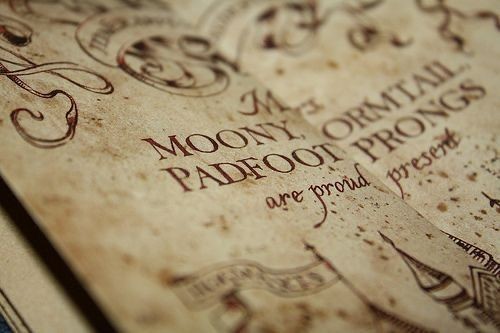
The Marauders Fandom defies the natural state of fandom culture. Within the realm of the spiderweb of links, clicks and likes, fandoms have been born, have been nurtured and have been destroyed. Typically these fandoms follow a particular mould: by focusing on canon events, characters, and relationships between said characters, more art, writing and wonder is born. However, the Marauders fandom is unlike any of its predecessors or any fandoms being born today. Though its characters were once residents of the world of Harry Potter, in the eyes of the fans they are no longer bound to the confines of their original character archetypes (and their minimal development) as provided by writer J.K. Rowling. The internet has created a fandom renaissance - a rebirth of the characters who were originally solely there as ancestors and side characters to the so-called Golden Trio.
With this rebirth comes a subversion of what people think they know. James Potter (the father of Harry Potter) and his friends are no longer the distant memories of a forlorn, mistreated young boy. Through headcanons, fanfiction, edits, and fanart, and the "fanon" versions of these characters, they are given substance, personalities and backstories much richer than those that were scrawled into the pages of the Harry Potter series. From All The Young Dudes by MsKingBean89 (the most-read fanfiction on Archive Of Our Own) to Crimson Rivers by bizarrestars, formerly known as zeppazariel, these characters are given new life.
A queer utopia - perhaps that is the best way to describe and define this fandom. As it has settled into its cozy corner of the web, the fandom has become more bold and outlandish in their ideas. Debates have run riot over romantic pairings and sexual orientations projected onto any and all characters clawed into the cast that is beloved by this ever-growing group of people. Is Remus Lupin "as gay as the day is long" (as he was described in the original print of Casey McQuiston's Red White and Royal Blue) or is he a bisexual man (as unfortunately rare as they are in the literary world)? That is just one of the many questions thrown around from tongue to tongue, from text to text, in this fandom. The importance of queer representation has been established again and again in our modern world, but it has existed and prevailed within the world of the Marauders Fandom.
The pairings in this fandom range from canon, sensible and strongly backed up with evidence from the original books (like James Potter and Lily Evans), to wild, wacky and completely obscure (like James Potter and Regulus Black). However, the fandom has decided to take their own route, no longer caring what words the creator Rowling has to say about her characters. On numerous occasions, J.K. Rowling has stated that Sirius Black and Remus Lupin do not have romantic feelings for each other, and yet 'Wolfstar', as they are so-lovingly nicknamed, is one of the biggest ships in fandom history. Alongside this, after the proclamations of Rowling's transphobic views mid-2020, the fandom took a stand declaring many of the characters (especially Regulus Black) to be transgender in their eyes. Through this, the Marauders Fandom has made these characters even more relatable for those who read about them. Even more notably, they have used these characters to take a political stand - to make it clear that we must stand up for those in our society who are shoved aside and discriminated against.
Fandom culture is taking art and making it into something even more beautiful, making it something that people relate to and adore even more than they did before. While the art originally belongs to the person who creates it, once it is put out into the world it becomes open to interpretation. People project onto songs, onto books, onto art and it helps them to escape the trials and tribulations they face within their realities. After all, isn't that what entertainment is truly made as - an escape? As a result of the Marauders Fandom, we can look towards a future where fandom is no longer defined by its canon, where it becomes a group of people who love something and share creative ideas together. As a result of the Marauders Fandom, fans have the ability and the opportunity to have a sense of more artistic expression, which ultimately leads to more media and literature for us to enjoy. The Marauders Fandom is a fundamental and quintessential part of fandom history - it is a story of its own, born and bred of minuscule threads and mere sentences about interweaving characters. It shows just how we as people are powerhouses of creativity and that, as is said in Dead Poet's Society (1989): "poetry, beauty, romance, love - these are what we stay alive for".
#marauders fanfiction#the marauders era#the marauders#marauders era#atyd#atyd marauders#wolfstar#jegulus#jily#harry potter#jk rowling#entertainment#books#media#journalism#entertainment journalism#fandom#fandom culture#harry potter marauders#marauders fandom#marauders fanart#marauders#incorrect marauders quotes#james potter#sirius black#remus lupin#peter pettigrew#lily evans#slytherin skittles#marauders girls
60 notes
·
View notes
Text
I have to work today, but there’s a lot I want to say about Jonathan and gender, and I won’t have the time to organize it in a proper essay, so here are some points:
1) Of fucking course men can have characteristics usually attributed to women and still be men. I’m working on a series of sci-fi adaptations of fairy tales, and in my Sleeping Beauty the protagonist is a (cisgender) boy, precisely because I want boys to see they can be vulnerable and need rescue too. And I completely understand if someone prefers to see Jonathan as a cis man because it’s so rare to see men in this role, surviving abuse, when it does happen in real life. I start my Gothic Heroine Support Group fic with Belle making precisely this point. Men can be prey, women can be predators. She knows this because that’s what happened to the original Beast, and kudos to Gabrielle Suzanne de Villeneuve, the author of the original Beauty and the Beast, for making this point centuries ago.
2) That being said, Jonathan seems to identify with women on a deeper level than being on a role in which women usually are. For me, what cements the headcanon is when he chooses the women’s quarters to sleep in, seeming to long for “a gentle life”, even if it involved sadly waiting for the menfolk to return from war. He seems to identify with the female identity, not only the female role. That’s only my personal interpretation, I fully acknowledge that. But seeing as it’s one that a lot of trans people in the fandom seem to share and, more importantly, to identify with, it’s one that is more than valid: it brings people joy. I’m cis. I’m also bisexual, and I know the joy of seeing myself in a character through subtext, and also how frustrating it is when people say it’s not true because it’s not 100% explicit in the text. If trans people are telling me they identify with Jonathan, I believe them and I take that as there being reasons I acknowledge I cannot fully understand why Jonathan is potentially a trans woman.
3) I assume everyone here has heard of Joseph Campbell’s The Hero’s Journey. But it’s less likely that everyone has heard of Gail Carriger’s The Heroine’s Journey. I fully recommend this book to everyone. But the point she makes is that whether someone is a “hero” or a “heroine” according to hers and Campbell’s analysis doesn’t depend on their gender. Women can follow Campbell’s Hero Journey, and men can follow Carriger’s Heroine Journey. And non-binary people can follow either. The names come from the gender of the characters who originated the archetypes, with Campbell’s being classic Greek heroes, and Carriger’s being ancient world goddesses. With that in mind, although no one has written a “Gothic Heroine’s Journey”, Jonathan Harker is a gothic heroine, regardless of whether you see him as cis man or trans woman, because he follows that story type step by step.
4) Does anyone here know of a transgender gothic heroine (in the gender neutral sense explained above)? Because I don’t. If anyone does, seriously, please point me their way, I’d love to increase my gothic knowledge. But it’s a type of representation I’ve never seen. As a member of a lot of minorities, I feel very happy whenever I see any of them represented in ways I’ve never seen before, and I can only imagine it’s the same for trans people. So what’s the harm in letting Jonathan be that? Seriously. All that is missing so far from Jonathan being a fully classical gothic heroine is him going around the castle in a flowing white dress. If I ever get to adapt my written version of modern day!Dracula, I’ll absolutely put Natália (my version of Jonathan) in a white nightgown, just to give a transgender actor the chance to play out this scene that I’ve seen so many cis women do over the years. Again, I understand if someone takes empowerment from Jonathan as a cis man surviving abuse, and I’d never want to take that away from them. Jonathan being a cis man is an absolutely valid reading too. But I think trans women deserve empowerment too, deserve to see a trans woman playing out a story so many of their cis counterparts have always had. The book is in public domain. We can each adapt them the way we choose. Cis man Jonathan and trans fem Jo, Natália, or whatever name you prefer for her, can coexist and be important to the groups of people each of them are important to.
153 notes
·
View notes
Text
An excellent rundown from The Stranger on JKR's Holocaust denial. As a Jewish woman who lost actual family in the Holocaust, her twisting of the narrative is genuinely offensive and harmful.
Hey all, it’s Vivian. If you've freed yourself from wandering the wasteland of weirdos and robots on x.com, you may not have seen a series of tweets from JK Rowling about trans people and the Nazis. Rowling first questioned if Nazis ever burned research on trans people (they did) and then linked a thread excoriating problematic grandaddies in the field, implying that trans medicine carried on a eugenic or Nazi legacy of human experimentation (it doesn't).
I really hate inaccurate history, so I called someone who actually knows what the hell they're talking about, University of Washington's Laurie Marhoefer, the leading expert on trans people and the Nazis. You just can't unpack this complicated, nuanced bit of history in a tweet.

A memorial in Tel Aviv dedicated to the LGBTQ victims of the Holocaust. URIEL SINAI / GETTY
Yes, JK Rowling, the Nazis Did Persecute Trans People
We Asked the Leading Expert on the Topicallot Initiative Success in Western
VIVIAN MCCALL Last week, children's book author JK Rowling tweeted some more nonsense about transgender people. In this case, she disputed the fact that Nazis destroyed early research on the community:
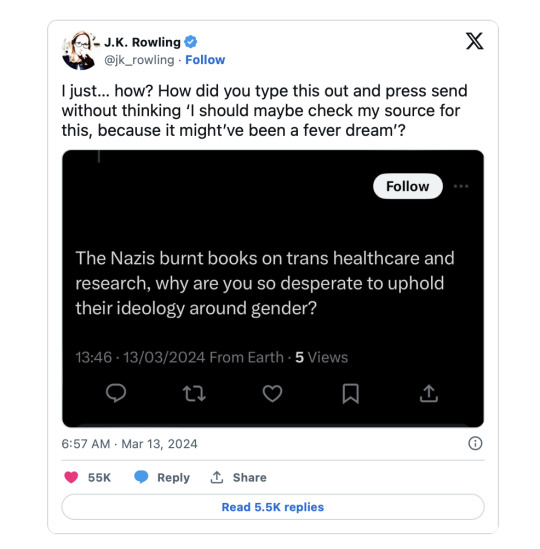
Despite Rowling’s dismissal, it is an established fact–not a fever dream–that the Nazis persecuted transgender people. And it’s not the first time this debate has come up on social media. Denying this history is part of an overall effort to discount the discrimination trans people still face in their pursuit of fundamental rights today. It is important to remember the truth and to evaluate what research we have, especially at a time when far-right attacks against trans people are increasing in the United States and elsewhere.
The Looting and Burning
In 1933, the Nazi-supporting youth with the German Student Union and SA paramilitary looted the Institute for Sexual Science (Institut für Sexualwissenschaft) in Berlin. The institute collected the earliest known research on gay and transgender people, and it helped people obtain legal name changes, medical treatments, and “transvestite certificates” from local police that allowed them legally to present as their gender.
Days after the looting, Nazis took to the streets to burn the 20,000 books looters found inside the building, and they placed a bust of the institute’s founder, Magnus Hirschfeld, on the pile in effigy. Hirschfeld was out of the country at the time, but he later died in exile in 1935.
In the years that followed, trans people were busted under German laws criminalizing sodomy and wearing clothes associated with their birth sex. They were imprisoned in concentration camps before and after the start of World War II. Some were murdered there. Others escaped with their lives.
We’ve Been Here Before
Since Rowling posted about the subject on x.com, misinformation about trans people in Nazi Germany has circulated widely. Some people have also claimed that the discussion of trans victims of Nazi violence distracts from the “real victims” of National Socialism. In light of this discourse, I called the leading researcher studying trans people and the Nazis, University of Washington professor Laurie Marhoefer.
“My first reaction was, they’re totally wrong,” Marhoefer said of the posts. “They’re not even in the ballpark. My reaction 1.5 was, ‘Oh this is eerie, the same thing happened in Germany two years ago.’”
Back in July of 2022, a graduate biology student named Marie-Luise Vollbrecht, who was known for her “gender critical” anti-trans views, made headlines in Germany.
She tweeted that the Nazis had never targeted trans people, and to say they did “mock[ed] the true victims of the Nazi crimes.” People responded with a hashtag that claimed she denied Nazi crimes. Vollbrecht filed a lawsuit against some of them, claiming their hashtag violated her rights and basically called her a holocaust-denier, which is a crime in Germany. She lost her case, and, after parsing the historical facts, the court officially recognized trans people as Nazi victims. A few months later, Germany’s parliament issued a statement recognizing the queer victims of Nazis and of post-war persecution.
We Don’t Know Much, but What We Do Know Is Grim
That ruling aside, this history is by no means complete. Scholars still don’t know much about the lives of trans people in Nazi Germany. Researchers have only recently started to study the subject and to undo false assumptions that cis gay men and transgender women were essentially viewed as the same in the eyes of their oppressors.
Through years of research and the review of published literature, Marhoefer has identified 27 criminal cases involving trans men, women, and gender nonconforming people in Nazi Germany. Locating them is hard work, and it requires parsing heaps of documents in non-keyword-searchable archives to find police files on a very small group of people that did everything in their power to avoid police detection. Marhoefer has 30,000 Gestapo files on their laptop alone. The little we do know, so far, is grim.
According to research from Marhoefer, beginning in 1933, Hamburg police were instructed to send “transvestites” to concentration camps. A person named H. Bode lived in the city, dated men, dressed in women’s clothes, and once held a “transvestite” certificate. After multiple public indecency and public nuisance convictions, she was sent to Buchenwald, where she died in 1943. Liddy Bacroff, a trans sex worker in Hamburg, died at Mauthausen the same year. Officials sent her there because she was a “morals criminal of the worst sort.”
Essen police ordered Toni Simon to stop wearing women's clothes, as she had done for years. She served a year in prison for disrespecting police officers, hanging out with gays, and speaking against the regime. The authorities called Simon a “pronounced transvestite,” and a Gestapo officer said placement in a concentration camp was “absolutely necessary.” She ultimately survived.
Unlike today, Marhoefer said, trans people were never a front-and-center political issue for the Nazis, nor were they rounded up in the same systematic way as Jews or the Roma. Nevertheless, the Nazis did specifically target them for their gender identities. On a fundamental level, transness was incongruous with Nazi ideology, a hyper-masculine fascism that emphasized purity and traditional gender roles.
The enforcement of moral laws prevented them from living as they did in the Weimar Republic era, the democratic government in power before Adolf Hitler and a time of limited acceptance. Magazines, nightclubs such as the Eldorado, and nascent organizations for trans people were shuttered. The state forced detransition, revoking a permit from at least one person named Gerd R. and driving them to suicide.
“I think we expect the crackdown, and then it’s all over their media, but it’s quiet,” Marhoefer said. “How many in a camp do we have to find before people will be like, ‘Okay, there was persecution?’”
While the Nazis did not often discuss transness much, at least one 1938 book, Ein Beitrag zum Problem des Transvestitismus, provides some idea of how party officials thought about trans people.
Author Hermann Ferdinand Voss described trans people as “asocial” and likely criminals, which justified “draconian measures by the state.” Nazi rhetoric also linked trans women and pedophilia, which mirrors the contemporary allegations from conservative Republicans about trans and queer people “grooming” children.
When they came after Hirschfeld, who was gay and Jewish, propagandists also framed homosexuality as a Jewish plot to feminize men and to destroy the race. Years before Nazis stormed his institute, the pro-party newspaper Der Stürmer labeled him the most dangerous Jew in Germany, which brings us to another point Rowling shared in a thread on X.
Problematic Granddaddies
After x.com users told Rowling that Nazis did, in fact, persecute trans people and burn research about them, she accused people who corrected her of valorizing Hirschfeld, rather than doing what they were actually doing, which was simply correcting the record.
Indeed, Hirschfeld, the granddaddy of the gay rights movement and a pioneer for trans health care, was a eugenicist. Furthermore, the early practitioner of vaginoplasty, Erwin Gohrbandt, who operated on Lili Elbe of The Danish Girl fame, was a Nazi collaborator connected to Dachau.
History rightly doesn’t look back on eugenicists and Nazi collaborators fondly, but those facts have nothing to do with whether or not Nazis persecuted trans people or burned research.
Apparently unsatisfied with spreading historical misinformation in one instance, Rowling followed-up with a tweet that directed users to a “thread on the persistent claims about trans people and the Nazis.” The thread implies that trans medicine is eugenic or Nazi in some way, and it draws a false connection between gender-affirming care and tortuous human experiments in the camps.
Broadly, the thread argues that early trans medical care constituted medical malpractice and the development of a new kind of sterilization in the form of gender-affirming genital surgery, and it contends that Gohrbandt performed his early vaginoplasties with the same regard for humanity as he displayed in his later work with the Nazis.
But the beliefs of these flawed medical pioneers have no bearing on trans people or trans politics, and conflating modern gender-affirming care with this early experimental treatment ignores the state violence trans people faced at the hands of the Nazis.
Despite Hirschfeld’s contributions to the field, people are right to criticize him for seeing the world through the lens of eugenics, even if that view was common in the 1930s.
Marhoefer literally wrote the book on his eugenic beliefs. Hirschfeld thought that gayness was eugenically beneficial because queer people did not reproduce, but he made no eugenic arguments for or against his work with trans people. He dedicated one of his books to eugenics, and he believed they sat at the heart of the science of sexology. And while he was critical of scientific racism, you can find anti-Black statements in his work, too, Marhoefer said.
Moreover, while Hirschfeld’s writings suggest he empathized with trans people and wanted to alleviate their suffering, he still staked a career on them. He photographed trans people in demeaning ways and trotted them out for demonstrations in front of other doctors.
It’s important to remember that Hirschfeld did not invent or create transness. The community existed before he discovered it, and the trans people themselves were not advocating for eugenic sterilization. The man was a trailblazer, not a saint. In fact, his approach to trans medicine laid the foundation for a system that forces people to jump through hoops for medical care. To this day, the majority of people who do trans medicine are not transgender themselves, and they do not always have the best interests of trans people at heart, Marhoefer said.
Gohrbandt would certainly make a list of medical practitioners who did not always have the best interests of trans people at heart. The pioneering plastic surgeon’s career bloomed along with his field, which quickly advanced to treat disfiguring battlefield injuries from World War I. He did not work at the institute, and because the surgeries were still very rare, he didn’t make a living performing them, Marhoefer said. We can count on one hand the number of gender-affirming surgeries he performed.
Unlike the Jewish and leftist doctors he worked with, Gohrbandt did not have to flee Germany. He endorsed the regime and later became the chief medical advisor for the Luftwaffe’s sanitary services division. In 1942, he participated in a secret conference on the results of fatal hypothermia experiments performed on Holocaust victims, and later reported the results in a German surgical journal.
Marhoefer said it is not strange that a future Nazi worked with progressive Jews on gender-affirming care in the 1920s. Many German doctors backed the regime and committed atrocities because they wanted careers.
There’s no defending Gohrbandt, but his path does not suggest anything unique and nefarious about gender-affirming care. It says more about the heartbreaking situation these trans people found themselves in when even the few doctors they could turn to for medical care treated them with disdain.
Marhoefer said doctors of the day took advantage of desperate women such as Elbe, Dora Richter, and Charlotte Charlaque, who was Jewish and fled the Nazis. They endured experimental surgeries with no oversight before antibiotics, patients’ rights, or ethics protections. Many doctors saw them as a means to an end in the overall development of plastic surgery.
What All of This Is Really About
Trans persecution is simply one story in a much larger one about the Holocaust. Trans people today who point out this history as right-wing attacks against them intensify around the world are not erasing the murder of Jews and Roma in concentration camps, or the extermination of disabled people, or the deaths of millions of Soviet POWS in Nazi Germany’s murderous campaign to seize eastern territory and farmland.
But this conversation is not really about Nazis any more than constant squabbles over gender-affirming care are about children. Nor does it honor victims of Nazi crimes.
No information, scholarship, or detailed account of a complicated history can satisfy someone who is fundamentally opposed to a person existing as they do. No number of mainstream medical organizations that again and again defend the efficacy of gender-affirming care can assuage their doubts. The benchmark for correctness is constantly moving and shifting, and the argument has no logical endpoint.
Meanwhile, ordinary trans people who rise to their own defense are labeled activists and needled for their wording, or their temperament, or their appearance, or the smallest misstatement.
At the same time, people like Rowling expect transgender laypeople to possess the knowledge of Holocaust researchers, of doctors, of psychologists, and of public policy experts. Every week, it seems, anti-trans interests push out another poorly researched hit meant to undermine the community’s existence in some way. It is trolling, and it is exhausting, and that’s all it is.
23 notes
·
View notes
Text
when i was in 7th grade, i had my first boyfriend. corny shit, i know. in many cases i dont think middle school relationships are enough to be classified as dating- but to this day, i do firmly believe our clumsy attempts at recreating the behavior of couples barely older than us did count. there was an emotional connection there. we had met in 6th grade and bonded over fnaf and minecraft 3 animations and all those other things that people still found found entertaining in 2014.
another notable thing in 7th grade that happened was that i had discovered i was transgender. well, i say "discovered", but it was honestly a long time coming. between my obsession with being seen as a "tomboy," my favorite song on the Kidz Bop 16 CD being Beyonce's "If I Were A Boy" (but sung in a way to make it so much less about cheating that it really became more of a call to action to imagine life as a man) to the point where i manually would loop it on my cd player for hours, and my growing love for mlm shipping— i had been a certified egg since i was in 4th grade. but despite being raised around and parented with about a dozen lesbian and gay couples since birth, i didnt know whether or not my parents were transphobic or not. so, after looking through a list of trans identities, i decided to just come out as genderfluid to my parents as sort of a compromise to the intimidating rigidity of being a trans boy. and even though it wasn't entirely fitting to what i'd ultimately figure out about myself, i grew pretty attached to it.
back to the middle school boyfriend.
at the end of 7th grade— like, a week before summer vacation— i publically came out as genderfluid. while my ex, who i will from now on refer to as Lou, had initially taken it well, albeit with some confusion, over the summer, a much different series of feelings began unfolding. unfortunately, as middle school boys are wont to do whenever one of them begins to act even slightly against the norm, his friends began asking him if he was gay. "if michael¹ is a boy sometimes, does that make you straight, or bisexual?" are some of the things i later heard them ask. and since i, phoneless till the age of 16, was unable to talk to him throughout this relentless picking apart of his own identity, by the time we got back to school, things were... different.
¹ Michael is the name i went by irl for 3 years from 7th-9th grade.
for one, there were the jokes. he was a big leafy fan (and i really did try even back then to steer him away from that but its hard when youre a cringe nerd middle schooler) and back then "attack helicopter" jokes were kind of all the rage, so he began jokingly identifying as a toaster. then he made a toaster mask out of a cardboard box, spray paint, and duct tape that he brought to school and began putting on whenever i walked by him in the hallway. and then, and possibly worst of all- a simple html website shared between his friends called "what gender is Michael today?" which lead to a random generator of options like, "boy", "girl", "toaster", and "attack helicopter." all of which is kind of a lot to deal with when youre a middle schooler with a pretty rough time of it already, and suddenly your main bully is the guy youve effectively been in a relationship with for 6 months.
and now you may be asking: hey habeas, why this sudden autobiographical deep dive into the most traumatic period of your life? what spawned this? how is this story relevant to literally anything going on? well, that's where the next part of the story comes in.
that year, our sex ed teacher was a 5ft transgender man named Mudd. Mudd had a buzzcut, and a higher pitched voice, and small hands, but beyond all of that, there was nothing visibly different about him than any other boy or man in the school. in fact, the boys thought he was cool as hell. they were fascinated by the idea of transformation of the self into an unrecognizable body. they never misgendered him, even after learning his status as a trans man. in fact, they were comfortable enough around him to be transphobic towards me. and Mudd, like a good trans mentor, told them to cut that shit out, and told me that regardless of how complicated and occasionally contradictory my identity was, it was still me, and i needed to stand up for who i was as a person.
a week later, Lou called me a tranny, and in response, i punched him in the nose and promptly stopped talking to him.
so again, why is this relevant? well, I'm not sure how terminally online (or specifically, on twitter) some of you are, but recently there's been a bit of a tiff in a certain fandom about bi lesbianism. specifically, how it, as an identity, is harmful to both the bisexual and lesbian communities. which, one: nooooo....??? bisexuality and lesbianism arent separate so much fraternal twins, and I've already talked too much to include further definitions to prove it. but my argument is really less about its validity as an identity and more about the principle of there being limits to acceptance, even within our community.
like with my experience, people were fine when they were faced with binary identities. a trans man like mudd is cool, or a trans girl like Jazz Jennings (we watched a lot of I Am Jazz in homeroom) could be seen as normal, and more so, inspiring. but when i came in with an identity people found to be contradictory or "too confusing," it resulted in backlash. the entire definition of being "queer" is to be abnormal to what general society finds acceptable, and even then, some things are "too weird" to be tolerated. even amongst "weird" people. which i find to be a pretty troubling trend amongst queer leftist young people who's only real experience with an "lgbt community" has been online. here, we prioritize and find catharsis in labels and categories to the point where the "queer community" has become instead split between identities- the gays, the lesbians, the bis, the transes, the aros and aces and the whatnot. in the real world, it doesnt matter what flavor of queer you are, nobody's going to stop and ask before they call you a groomer and then legislate your freedom away. which is why we, as an online queer community, have to get rid of the notion that some identities are "too contradictory" or "dont exist" enough to be worth giving support and love.
im saying all this here... because, well, one: nobody wants to read a 40+ tweet thread about my personal brush with irl homophobia and how that radicalized me against community separation in general, and two: i am deeply afraid of 14 year olds on twitter with too much time on their hands. but also im saying this because it was infuriating yesterday to watch my entire twitter feed suddenly turn into a puritanical campaign against the very concept of someones identity and have the ability to say nothing. it disgusted me how quickly we turn against our own simply because the way they are is confusing to our tiny fucking peanut brains. and i know none of those people who went on that tirade will read this, but i felt like it needed to be said anyways.
don't let society's impulse to ostracize the confusing and strange win out over human decency. don't do conservatives' strategy to divide and conquer us for them. a person's identity not being comprehensible to you is not inherently an attack on who you, yourself, are. you are your identity and you should stand up for it, and you should stand up for others' identities too. punch your bullies in the nose.
long live the confusing, the contradictory, and most importantly, the queer.
#habeas speaks#discourse#oh no hes on a soapbox again guys look out#hey sqlumi if you see this ever i hope you know that i think youre cool as hell for giving a middle finger to the entire operation#sorry so few people jumped to your defense and that you had to delete your twitter ik how hard it is to build a following there#aaaaanyways#pinning this for a day or two just bc
66 notes
·
View notes
Text
Today's LGBT+ Character is
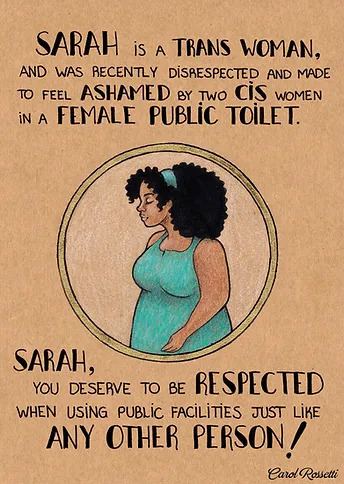
Sarah from Carol Rossetti's Women Series-Transgender Woman
Species: Human
Find the rest of the Woman Series here
Requested by Anon
Status: Alive
#Sarah Women Series#transgender#lgbt#character of the day#lgbt poc#art series#carol rossetti#not my art#requested#fandoms I'm in#LGBTQueue#alive
38 notes
·
View notes
Text
Okay -- so my visual aids for this post are very limited since Disney+ will not let me properly screenshot this and there are no good quality versions of this on Youtube anymore...but I need to talk about Disney's The Little Mermaid TV series for a second. Specifically, one episode very near and dear to my heart called Metal Fish, which features a human explorer going down in a fish-shaped submarine to the bottom of the ocean, getting stuck, and being found by Ariel and her friends.
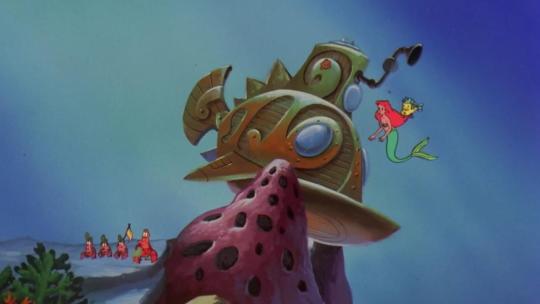
Now honestly, watching the episode again, there's a lot I don't love about it. Sebastian's whole subplot with the crab scouts is really kind of annoying, and I skip every bit of it. But I love the character of Archimedes (even if he never appeared in the show again! Boo!), and -- more importantly to today -- there's this wonderful moment right toward the beginning of the third act of the episode where Ariel and our human explorer lay eyes on each other for the first time, and there's just this electric connection.

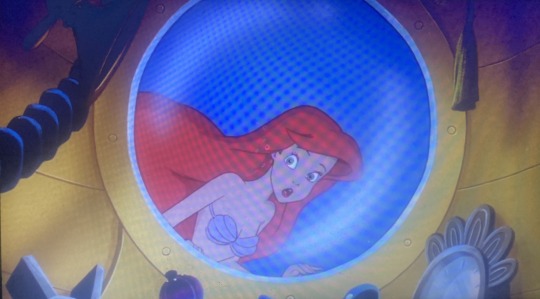
Something that bypasses words -- this sense of wonder, enchantment -- almost enlightenment. And is it surprising? No! Ariel is the spitting image of what the human explorer had in his mind, when he was dreamily sketching out what a mermaid could look like, back on land.

And of course, at the end of the episode, what else should the explorer end up being named, but Hans Christian Andersen? And what else would he do, after being rescued by a mermaid, but use it as inspiration for one of his most famous fairy tales?
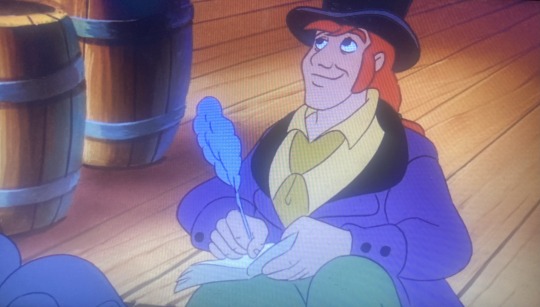
Okay, yeah, admittedly Hans Christian Andersen was a much sadder and more dysfunctional brown-haired human being IRL (just watch this video for a nice deep-dive about this disaster gay/bi/honestly-maybe-even-romantic-ace)...not to mention he wasn't even half this dashing nor close to being vocally similar to the great Mark Hamill...but one thing I absolutely love about this episode, and the aspect I personally respond to most, is the choice the series' creators made to have their interpretation of Hans Christian Andersen and Ariel have a very striking visual similarity, as well as similar personalities.

Many theorize that the original little mermaid was a self-insert character for HCA, with his fairy tale being a fantastical lament about the one-sided love he felt for the son of his most significant patron, Edvard Collin, who -- like the mermaid's prince in the original -- fell in love with and chose to wed another. There's even preserved correspondence by HCA where he writes of his feelings for Edvard being "those of a woman." And although this is more likely about HCA struggling to express romantic feelings that felt out of place in the very religious, heteronormative world he was a part of than about HCA himself identifying as transgender, I still think it was such a sweet little gesture for this episode to highlight Ariel and HCA seeing themselves in each other.
And this is where I wish SO MUCH I had some good quality video so I could truly share this piece of the episode with all of you -- because the moment where Ariel and Hans see each other for the first time gives me such life.
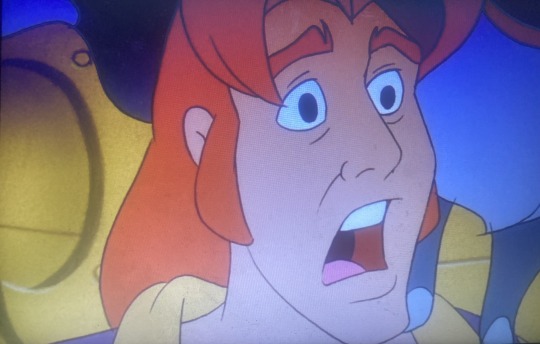

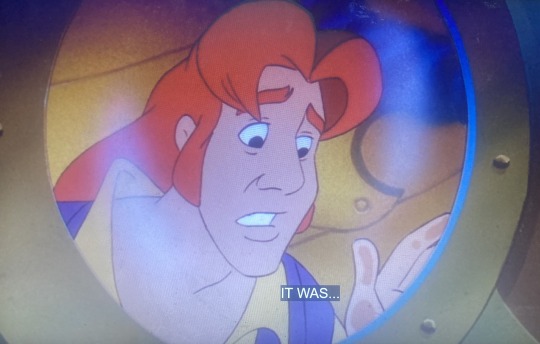
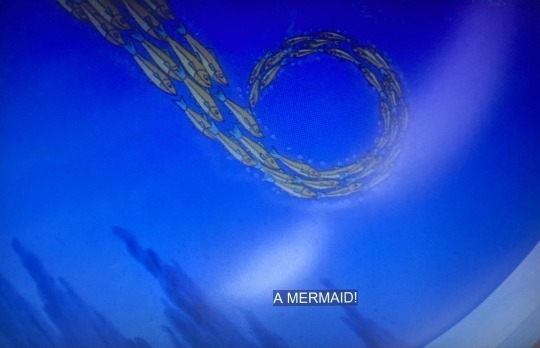
When Hans first sees Ariel, he's lost for breath, and he sounds and looks almost bereft when she disappears from view. When Ariel first makes eye contact with Hans, she clutches her face and hair, almost as if seeing herself clearly for the first time. And the whole time, they're looking at each other not fully face-to-face, but through glass and water -- almost a reflection of each other. Because...they are.

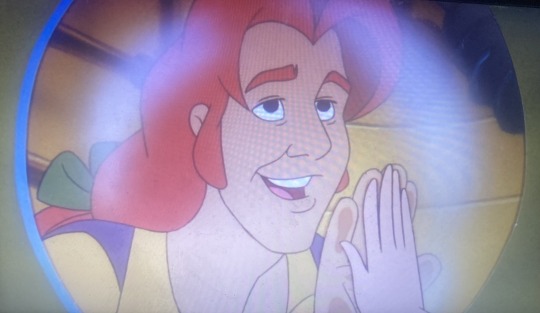
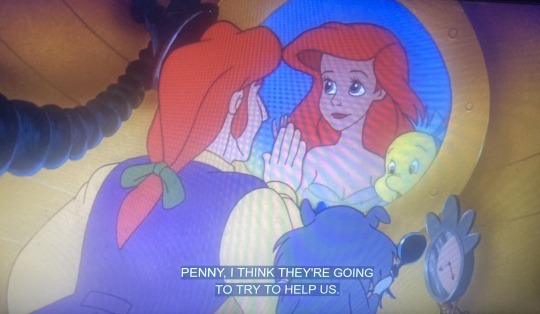
I'm sorry, I fail to articulate how utterly beautiful this is. No love story could ever capture the emotion this short scene instills in me. A platonic connection so powerful that it transforms you and how you see yourself forever. Meeting another person and, in doing so, truly knowing yourself for the first time.
However much I might praise The Little Mermaid TV series primarily for its music, there are also moments like this that remind me how wonderful Disney's adaptation of Andersen's story really is.
#sorry I just wanted to share these feels don't mind me#but I mean seriously the porthole is SHAPED LIKE A MIRROR#they literally see *themselves* while looking at each other!!#I know HCA was probably not trans IRL and I myself am cisgender but I'm sorry this just floods me with feels#yes these are pictures I took with my phone bc disney+ won't let me screenshot sorry for the bad quality#I must admit I do also find it funny that in frozen they also decided to make *their* hans a ginger even if I'm sure it wasn't bc of this#disney#the little mermaid#the little mermaid tv series#hans christian andersen#analysis#trans pride#lgbtq pride
30 notes
·
View notes
Text
When I was in college, I wasn't the quote unquote perfect activist. I am definitely not immune to making mistakes, especially in the heat of emotional moments. But...let's talk about my experiences for a moment.
-During my first semester of college I joined my university's local PRIDE club. I suggest that we do some sort of clothing drive, and have a place where anyone can give or take clothing. The intent of this was obvious and person: I came from family who either did not really understand my transness or actively disapproved of it and didn't have an income. I could not be the only one. We should be helpful in this way, to our trans brothers and sisters.
Sometime later, someone suggests changing the clothing drive into a clothing sale to fund their Drag Ball. PRIDE under that semester's leadership never does a clothing drive. My vision would not be completed until a couple of semesters later, working with my university's LGBT Center, and working loosely with PRIDE's new management.
-The one thing I failed to notice coming into PRIDE was that I couldn't find other trans women. That didn't bother me, and I was fairly popular early on. This was until someone else came out as a transgender woman. Initially I was happy to have another trans woman as a friend, but I very quickly began to notice the social effect. They were shorter, smaller, and more femme. Their social transition progressed much faster than mine, because they weren't poor. They regularly got many clothes from their friends in PRIDE, even as discussions occurred about a clothing drive. I got nothing. I was being outfemmed.
-I noticed the uplifting of drag performers and drag stars by many of my cis and nonbinary peers in the group. I often asked myself why this happened. For some of these people, drag was almost a lifestyle. The performance of hyper-femininity by someone who was AMAB in the context of a drag show was met with cheers, applause, fandom. Meanwhile, my displays of my own femininity were met with nothing. Those same people never complimented me.
-The president of PRIDE gave a presentation on the history of drag. They mentioned Ru Paul, but handwaved away their trans-misogynistic comments, saying they were unimportant.
-A considerable amount of time later, our LGBT Center did a wide survey of queer people on campus. Some responses by cis lesbians bemoaned a lack of lesbian support groups, and more importantly, that they didn't feel like they ever saw anyone that looked like them at the center. I object to this finding, because I myself am a lesbian, I am what they are looking for and am always at the center. I bring up the possibility that the comment may be transphobic. I am shot down. I was denying other people's feelings. I was a trans woman, not a lesbian.
-A dear friend of mine suggests doing a PRIDE event about learning how to do make-up. This is something I was in great support of, because I did not like the extent trans women were expected in a very short span of time to grasp all the complexities of the role of woman in today's society, when cis women get so much longer. What will not be included is tutorials of using make-up to cover facial hair follicles. They did not want to focus on tutorials about passing. I protest, in part because the darkness of my follicles is something I'm very self-conscious of, and that passing in itself is something that a lot of trans woman want. The make-up event never happens.
-A trans woman is talking about her transition experience. She is notably well off and has gotten a variety of surgeries. She explains this is ultimately the path that all trans women need to take, unless they end up looking like "fishy boys". This notably impacts my friend in a severe way.
-A series of hate crimes strikes campus rapidly. Someone spray-paints the "N" word on one of the school buildings, while conversion therapy pamphlets are deliberately left in classrooms teaching about LGBT subjects. Campus police do not care to investigate. PRIDE and BSU being to work collaboratively on a protest. The atmosphere is very good, there are a variety of different but very good conversations, and both groups work well on various tasks that were planned. The protest does not focus on what happened to LGBT students. Members of the LGBT Center and of PRIDE did not speak. We, who had been working hand and hand, were reduced to a footnote and a one-liner in a chant.
-While asking for more information about the investigation into both of these incidents, myself, the Title 9 administrator, and one of my coworkers, a black queer woman, are invited to a meeting with the VP of Student Affairs and the detective on the case. None of us were made aware of the presence of the chief of police nor of a third officer whose purpose was unknown. These investigations would never result in anything.
-In the issue of the school newspaper that reported on the hate crimes, included as well along side of it was a story about how conservatives felt like they were being silenced on campus.
-When I first went to college, I went to Housing to discuss the possibility of gender neutral housing, which they have on their website. I am told there is none, but they can make an accommodation by giving myself my own dorm room on the men's floor. I had been unable to transition before this point because of living with religious conservative family members. I am told that if I want to have a room on the women's floor, where I would have a more private showering area that was not a public shower with other men, that I would need the gender on my birth certificate changed.
Both of these were lies.
-I have a discussion with my mother about her continuing to deadname me, noting that I did not want to end up confusing my niece once she became old enough to remember my name. This does not change.
This is just, the experiences that I can recall while writing this post. It is not an exhaustive list. Discussing school administrations chronic underfunding of the LGBT Center and the resulting drama that caused over years would be an entirely new post. There's possibly even more stuff that I've simply just fucking forgotten over the years. It wasn't all bad. I met some truly incredible people and did some truly incredible things.
But there was bad. Some of it was general, but a lot of it was trans misogynistic, even if I don't think it was always intentional. A lot of these experiences changed me into the jaded bitch I am today on a lot of issues.
17 notes
·
View notes
Text
Today's LGBT+ Headcanon is;
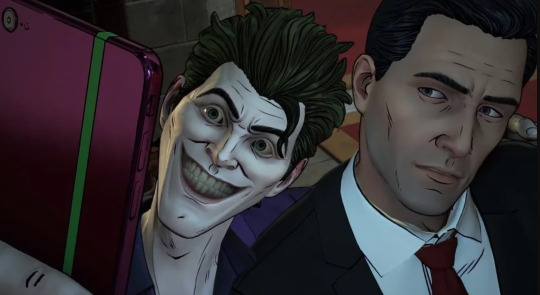
John Doe |Joker and Bruce Wayne |Batman from Batman; The Telltale Series-Pansexual Transgender Man and Bisexual Respectively
Species: Human
Status; Alive
#john doe telltale#Bruce Wayne#batman the telltale series#pansexual#transgender#bisexual#lgbt headcanon#character of the day#telltale bruce wayne#telltale joker#mlm#lgbt#headcanons#video games#Batman#DC#lgbt couple#mlm couple#telltale juce#batjokes#batman x joker#personal headcanon#fandoms I'm in#keuw#((this is one of the gayest versions of Batjokes))#((I love them and this version is the least iffy I feel about shipping them))#((I mean I ship BatJokes anyway but Juce is peak for me))#((Also if you show me a Joker that doesn't give off genderqueer vibes then I will show you a badly written Joker))#((Arkhamverse gives off old he/they trans man vibes but that's overshadowed by the insane amount of Hornee he is))#alive
49 notes
·
View notes
Text
Book Birthday!
The Framed Women of Ardemore House
Today’s the day! This has been a long journey; I’m a historian who writes about social justice most of the time (with an upcoming book on interwar transgender history). I’m also non-binary and autistic, so representation means SO MUCH. I think many of us here have been following GoodOmens (congrats on the big win!) and OFMD, stories that give us sensitive and celebrated diversity. GO, in particular, made me feel ‘seen’ at a critical time in my life. This is my first fiction, book one of a series, and I wanted to show some of what it’s like to navigate the world as neurospicy—but without the cliche or stigma. If mystery fiction is your jive, I hope you will think about reading!
Autistic protagonist determined to be herself
Strong women characters, LGBTQ characters, disability representation
Murder in the manor
Dual POV
Double mysteries
Gothic elements and literary Easter eggs
A sharp, savvy mystery about an autistic editor who inherits a crumbling English estate, only to find herself at the center of a murder investigation when a family portrait vanishes and a dead body turns up.
#good omens#autistic author#cozy mystery#books#neil gaiman#booksbooksbooks#british mystery#ofmd#lgbtq representation#autistic protagonist#disability#book launch#book birthday#neurospicy#neurodivergent#adhd
14 notes
·
View notes